Special Report

In January 2020, the World Health Organization (WHO) classified the new corona virus (COVID-19), which started as an outbreak in China’s Hubei Province, to be a Public Health Emergency of International Concern. In early March, it declared COVID-19 a global pandemic as it rapidly spread worldwide; to date, over 82 million people have been infected with over 1.8 million succumbing to the disease. The Philippines was not spared from the effects of COVID-19, recording its first case on January 30, 2020. A few days after, on February 1, the first death outside China was recorded in the country.
Source: WHO: https://covid19.who.int


In response to the ongoing threat of the virus, the Philippine Government declared a state of Public Health Emergency and created a multi-sectoral response mechanism through the Inter-agency Task Force (IATF) which aims to contain the spread of COVID-19 and mitigate its socioeconomic impacts. On March 16, the government announced the implementation of the Enhanced Community Quarantine (ECQ) in the whole island of Luzon. The implementation of the ECQ limited mobility in the island, only allowing people to leave homes for basic necessities such as food and medicine. Public transportation and recreational services were temporarily suspended and only those classified by the IATF as essential workers could report to their workplace.


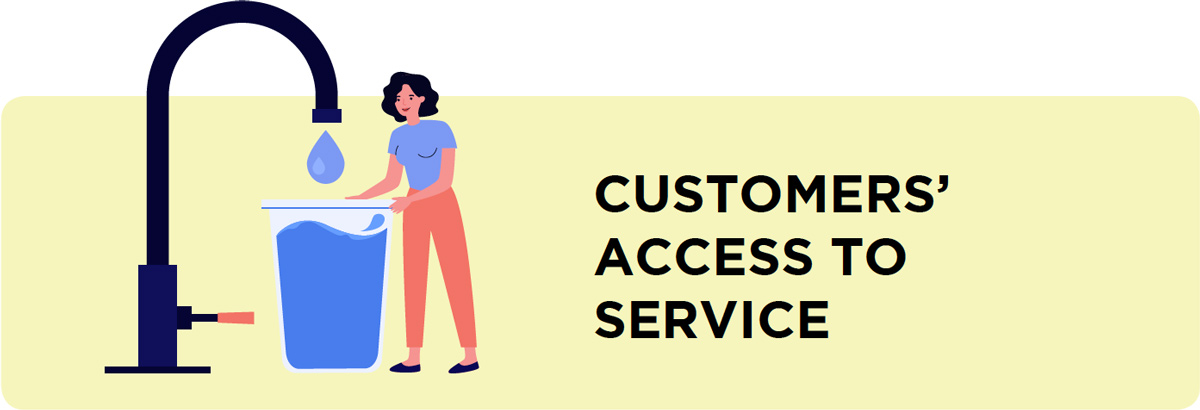
The COVID-19 pandemic has brought unprecedented challenges to Manila Water; a magnitude of which it has never experienced before, and at a time when the Company is recovering from the 2019 Water Crisis. However, ensuring business continuity and uninterrupted service to customers were the primary objectives of the Company, while ensuring safety for its employees, support to service providers and customer access to services.
Forefront to the Company’s response is the activation of the Incident Management Response Team (IMRT) led by the Business Continuity Team and the Corporate Human Resources Group with the team’s first critical mission was to keep all employees safe in their working environment.
Prioritizing Employee Safety and Well-Being
Manila Water undertook key measures to ensure the safety of all employees, regardless of work arrangement through Employee Safety Services and Workplace Safety Programs. Wellness Programs were likewise implemented which values the overall well-being of employees.
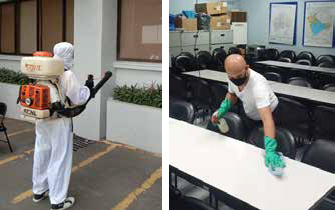
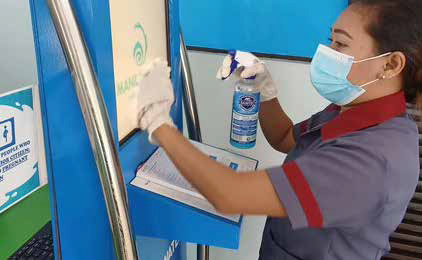
Through these programs, the Company continuously engages and keeps the organization updated albeit through digital platforms.
Meanwhile, keeping the workplace clean and sanitized was also prioritized. Disinfection activities were immediately performed in all facility premises, including offices, vehicles, common areas and shared equipment. This was done for most of the facilities on a daily basis. All personnel were also provided with Personal Protective Equipment; over 1,000 face shields and over 60,000 face masks were distributed since March 2020. Additional protective gears were provided to those reporting to areas that are more exposed to the virus. Safety applications were immediately rolled-out for the purpose of checking, tracking and transportation. Employees were also tested for the virus prior to re-entry and were provided with the necessary kits and guidance on the other protocols implemented by the Company.
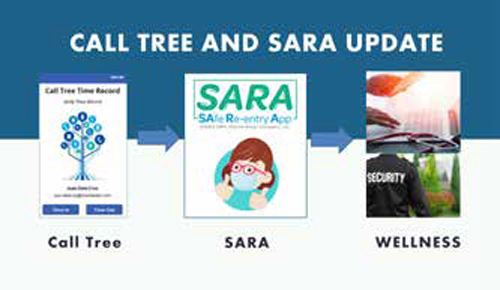



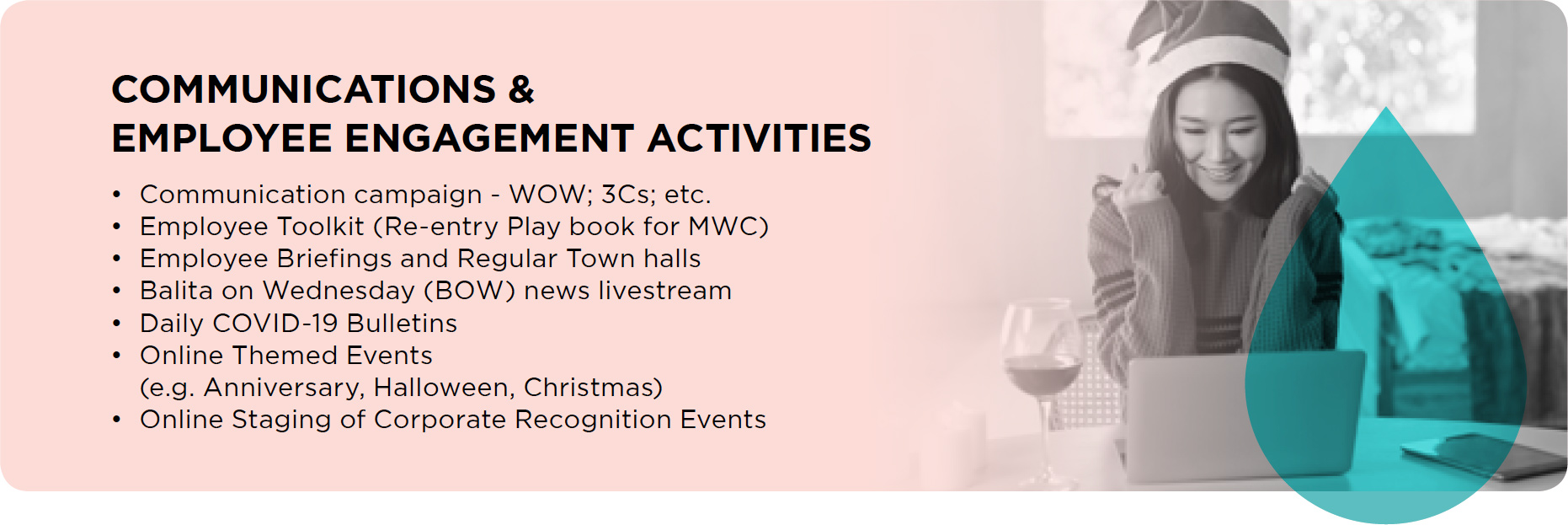
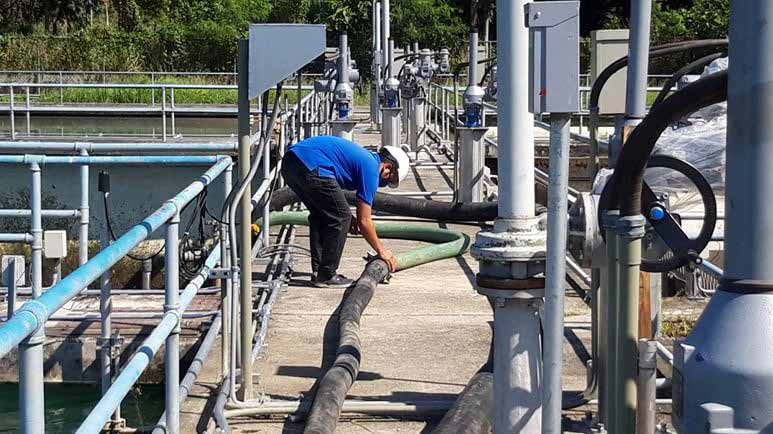
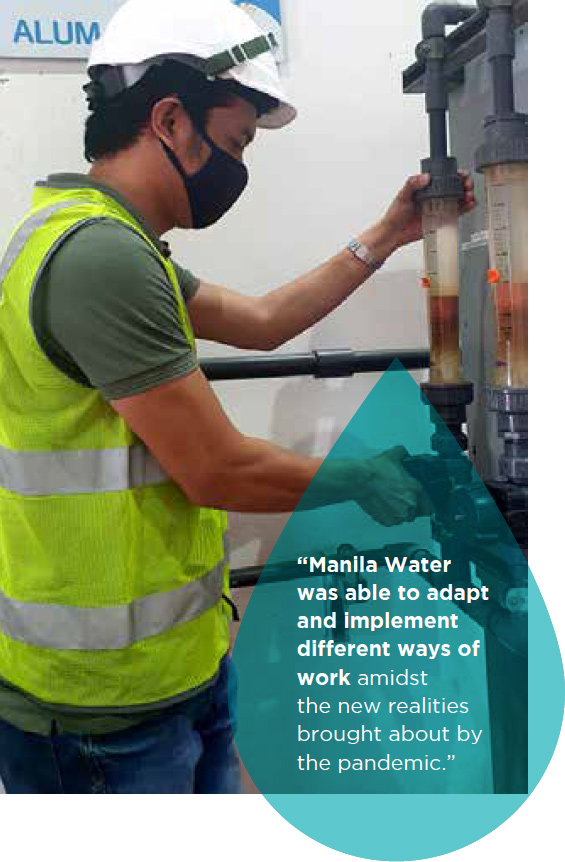
Furthermore, during the period of the ECQ, Manila Water set up more stringent measures in its offices and facilities, thereby limiting access to identified authorized personnel to enter specific areas and facilities within Manila Water premises. This meant that several key personnel temporarily lodged in the facilities. Sleeping quarters were made available, as well as sufficient supply of food and grocery items delivered directly to the employees, while at the same time accommodating service providers, such as utility and security personnel.
Operating in the New Normal
With hundreds of facilities to operate, Manila Water encountered issues in its operations as the quarantine restrictions were in place. The primary issue was due to lack of manpower as several employees were unable to report to work. Similar with the rest of the country, Manila Water employees were faced with: (1) the lack of or absence of public transportation; (2) getting stranded within a locked down community; and (3) health concerns due to COVID-19. Even with the means to travel to the workplace, the Company wanted to ensure the safety and well-being of reporting employees, thereby shifting the Company to a skeletal workforce operating its facilities.
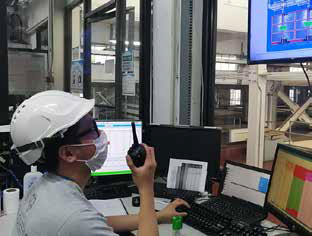
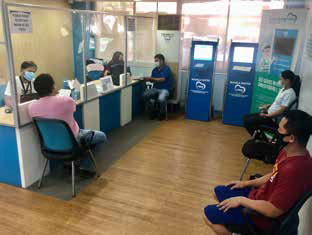
Meanwhile, the transportation of raw materials, both for project implementation and operations, was also affected due to government regulations which limited mobility. This was also the issue in the deployment of service providers and contractors, as well as due to lower manpower of contractors, vendors and suppliers. These led to delays in several key services such as sanitation, water and network maintenance and project implementation.
On the business operations side, Manila Water temporarily suspended its meter reading and billing activities as well as face-to-face customer interactions for complaints resolution and collection activities. Upon resumption of these services, Manila Water received over 30,000 customer requests and complaints in the third quarter, significantly higher than the Pre-ECQ level of just over 15,000. Billing complaints were two times the pre-ECQ level brought about by the resumption of actual billing which covers the period when the Company suspended its meter reading and billing activities.
Furthermore, the temporary and permanent closing of commercial establishments, including those engaged in manufacturing and construction, put pressure on the Company’s revenue generation. While the aggregate billed volume was higher than the previous year, this was mostly attributed to the residential segment which has a lower average tariff than the commercial and industial segments as people stayed in their homes during the quarantine. Collection levels were severely affected as restrictions posed challenges for customers to pay their bills. Disconnection activities were likewise suspended for a period of time, and the Company provided installment payment schemes in line with the Bayanihan Law.

Adapting to the New Normal
Manila Water was able to adapt and implement different ways of work amidst the new realities brought about by the pandemic which led to the continued provision of 24/7 water supply to its customers with minimal unplanned service interruptions (i.e. Typhoon Ulysses), as well as the resumption of previously suspended services and activities, while complying to government health and safety guidelines. The creation of a digital working environment paved the way for all employees to connect and to continue with their work, without sacrificing productivity.
Digitizing the Work Environment
Successfully adapting to the new normal was made possible through the utilization of digital platforms. The organization incorporated more online facilities in its processes, making it easier to remain productive even in a remote working environment. The active use of available online applications was implemented enterprise-wide: (1) meetings, presentations and collaboration acivities; (2) document approvals and processing; (3) internal and external Company events and announcements; and (4) employee engagement activities.
Also, to maximize reach and provide convenience, the Company launched the Manila Water mobile application, empowering the East Zone customers to have access on their bills, make online payments and report any service concerns. Manila Water likewise maximized its Operations Management Center (OMC) which provides a purview of the Company’s facilities and customer experience. The technical and business teams are able to immediately address customer service issues using the data generated in the OMC.
Continuing Commitment to Service Mission
Manila Water’s service mission of providing genuine service to its customers is front and center to the Company’s response to any challenge it faces. The limitations brought about by the pandemic did not stop Manila Water from upholding its service standards.
Treating the pandemic as an incident, the IMRT ensures that the Management Team of Manila Water is aware of all issues concerning employee welfare, technical and business operations prompting immediate action from the line. The implementation of safety protocols as well as stringent controls enabled the Company to minimize service interruptions and facilities downtime. Planned activities were closely monitored and emergency activities were completed within committed turn-around.
Even with mobility limitations, the territory management team of Manila Water ensured that it was able to respond to customer inquiries and complaints within service standards. The teams were proactive in customer communications through different channels, such as social media, text blasts and website announcements, providing information to customers as regards planned activities, emergency works and significant service announcements. Upon resumption of face-to-face customer interaction, the Company ensured that employees and customers follow social distancing and safety protocols.
The Company thrived in its recovery from the first of half of 2020 when stricter quarantine restrictions were in effect. Upon easing of these restrictions in the second half, Manila Water pursued activities which led to significant recovery in key business and operating indicators.
East Zone
| 1H2020 | FY2020 | |
|---|---|---|
| CAPEX (in Million Php) | 3,140 | 9,840 |
| Collection Efficiency (YTD %) | 63 | 92 |
Sustained Key Results Indicators amidst the pandemic (East Zone)
| 2020 | |
|---|---|
| Water Availability (%) | 97 |
| Billed Volume Growth (%) | 2.5 |
| Response to Service Complaints (%) | 99.4 |
MWPV
| 1H2020 | FY2020 | |
|---|---|---|
| CAPEX (in Million Php) | 748 | 2,249 |
| Collection Efficiency (YTD %) | 83 | 95 |
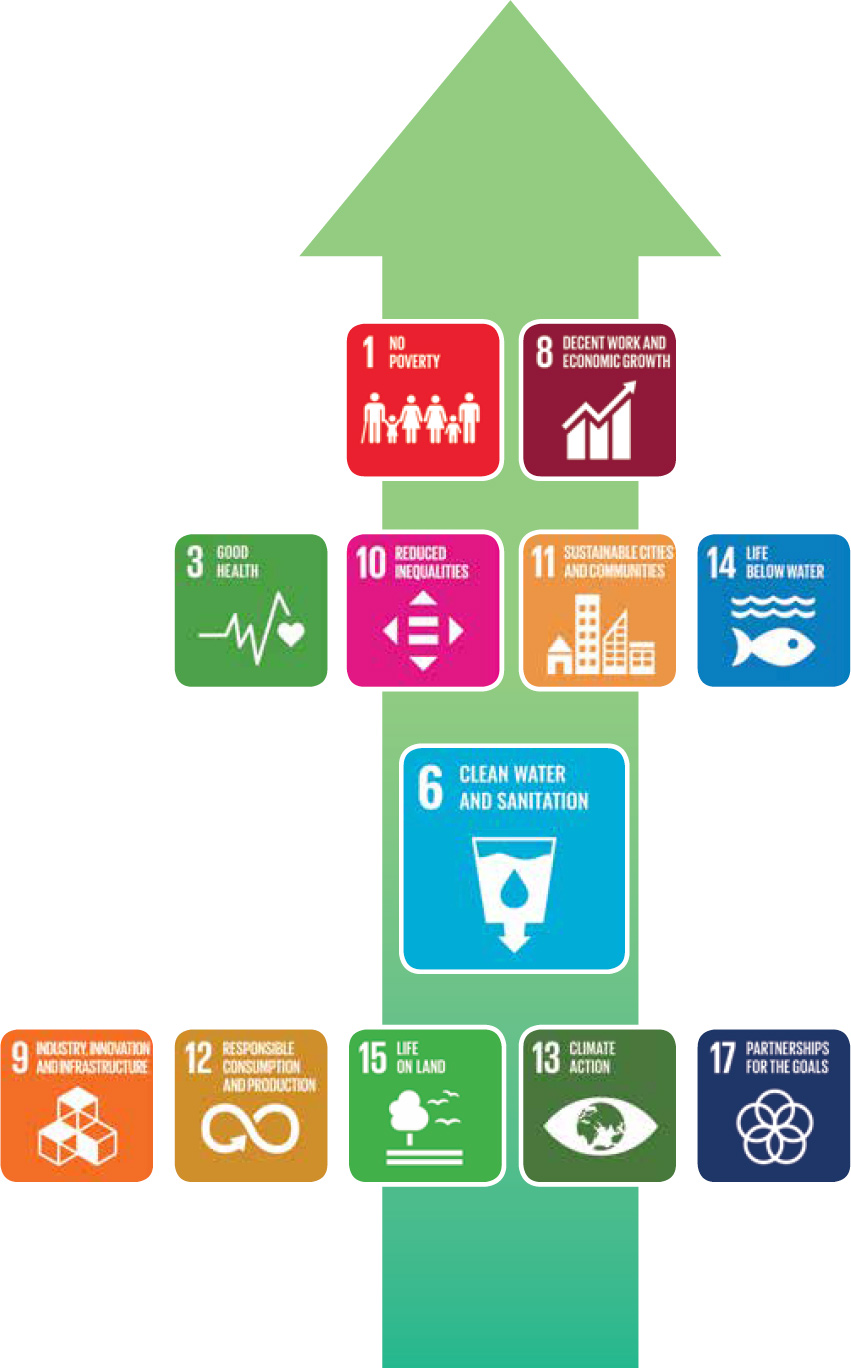
Moreover, to ensure that Manila Water has enough financial resources to meet its service obligations, it successfully issued its maiden Sustainability Bond in July 2020 amounting to USD500 million, debuting in the international debt capital markets. The bond issuance enabled the Company to diversify its fund sources, refinance maturing obligations, as well as fund its committed water and wastewater infrastructure projects in the East Zone Concession. The proceeds from the bond are targeted towards financing projects related to (1) Sustainable water and wastewater management; (2) Terrestrial and aquatic biodiversity conservation; and (3) Affordable basic infrastructure categories.
Providing Support to the Nation
Part of Manila Water’s service mission is to ensure that it takes part in the nation’s response to the COVID-19 pandemic by extending help to communities and providing the necessary assistance, especially the frontliners. Through proactive coordination with national and local governments, the Company was able to provide (1) drinking water and hygiene kits to public hospitals, local government units, police personnel and quarantined individuals; (2) static water tanks in various locations for disinfection of vehicles travelling along major roads; and (3) shower facilities, static water tanks and water dispensers at WTC: We Heal as One Center COVID-19 facility.
The Sustainability Bond supports the commitment of the Company towards the delivery of the Sustainable Development Goals.